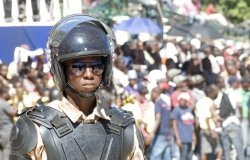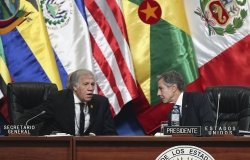El Salvador's Democratic Transition Ten Years After the Peace Accord
Overview
Summary of a meeting with Ricardo Guillermo Castaneda, President, Consejo Empresarial Salvadoreño para el Desarrollo Sostenible; Rubén Zamora, political leader, former WWC Public Policy Scholar; Miguel Cruz, Director, Universidad Centroamericana José Simeón Cañas, Instituto Universitario de Opinión Pública (IUDOP); Terry Karl, Director, Latin American Studies, Stanford University; Sandra Barraza, Coordinator, Comisión Nacional de Desarrollo; William Pleitéz, Senior Economist, United Nations Development Program; and José Roberto López-Calix, Senior Economist, The World Bank.
Panelists agreed on the central and enduring achievements of the Salvadoran peace agreement: the demilitarization of politics and an end to political exclusion; the separation of the armed forces from the political life of the country; improvement in the respect for human rights; freedom of speech; and a process of modernization and reform of key institutions. In the post-accord era, inflation has fallen, exports have risen, and the economy has grown. Yet at the same time, Salvadoran society remains polarized and stratified, characterized by widening gaps between rich and poor and urban and rural populations and heavily dependent on remittances from Salvadorans abroad.
Rubén Zamora identified as a major problem of the Salvadoran transition that fact that political parties received a larger quota of power without themselves going through a process of reform; that is, the major agents of the transition were not up to the challenge. Miguel Cruz highlighted the complexity of public opinion regarding the peace process; although a majority has consistently viewed the accords positively, major problems such as criminal violence and the state of the economy are seen as failures of the peace process. Terry Karl questioned the kind of democracy being constructed in El Salvador, noting the inter-related transitions from war to peace and from authoritarianism to electoralism.
Sandra Barraza described the effort to build consensus around a national development plan, noting ongoing deficits in human capital and a disproportionate share of public investment in and around San Salvador. William Pleitéz noted that poverty decreased during the 1990s, but still affected 47.5 percent of the population. For the last five years, growth rates fell below 3 percent and growth was concentrated in the maquila sector. José López-Calix stressed the importance of regional economic integration to El Salvador's future development as well as the need to channel remittances into productive investment.
by Cynthia J. Arnson
Hosted By

Latin America Program
The Wilson Center’s prestigious Latin America Program provides non-partisan expertise to a broad community of decision makers in the United States and Latin America on critical policy issues facing the Hemisphere. The Program provides insightful and actionable research for policymakers, private sector leaders, journalists, and public intellectuals in the United States and Latin America. To bridge the gap between scholarship and policy action, it fosters new inquiry, sponsors high-level public and private meetings among multiple stakeholders, and explores policy options to improve outcomes for citizens throughout the Americas. Drawing on the Wilson Center’s strength as the nation’s key non-partisan policy forum, the Program serves as a trusted source of analysis and a vital point of contact between the worlds of scholarship and action. Read more
Thank you for your interest in this event. Please send any feedback or questions to our Events staff.










